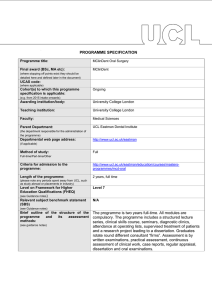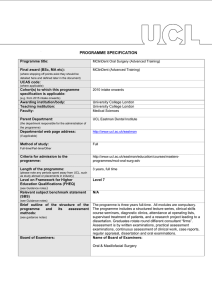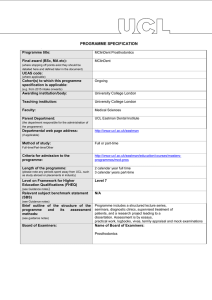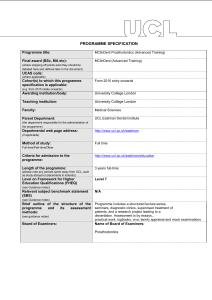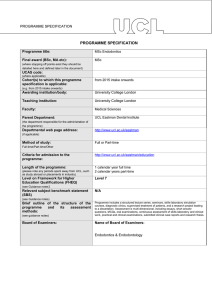PROGRAMME SPECIFICATION Programme title: Final award (BSc, MA etc):
advertisement
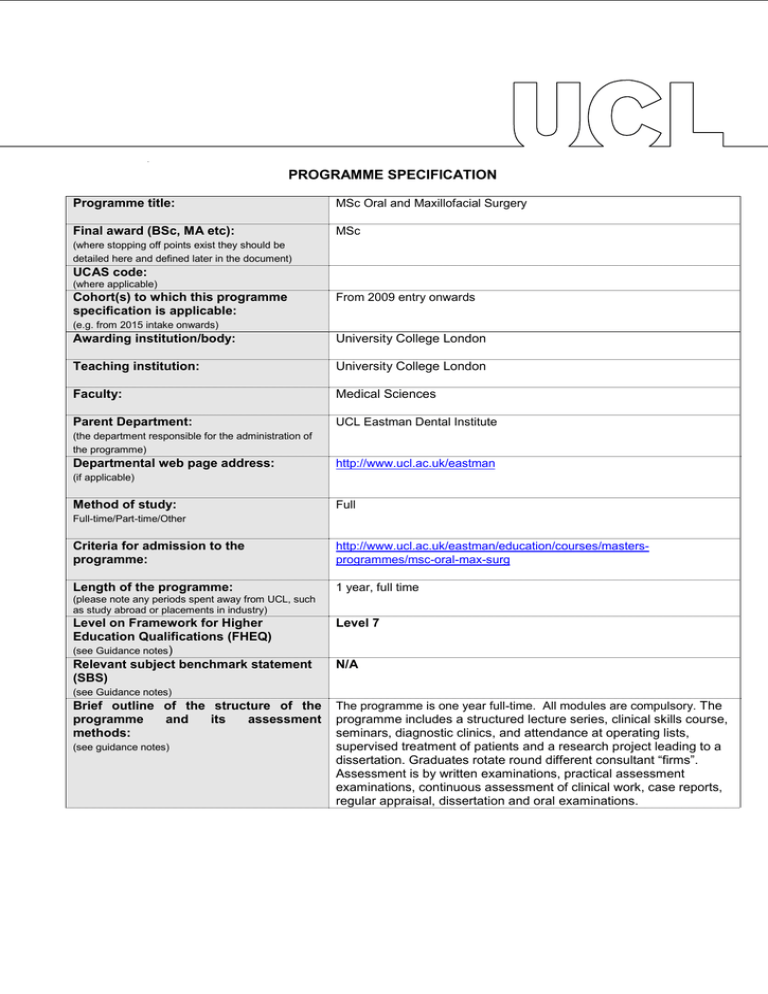
PROGRAMME SPECIFICATION Programme title: MSc Oral and Maxillofacial Surgery Final award (BSc, MA etc): MSc (where stopping off points exist they should be detailed here and defined later in the document) UCAS code: (where applicable) Cohort(s) to which this programme specification is applicable: From 2009 entry onwards (e.g. from 2015 intake onwards) Awarding institution/body: University College London Teaching institution: University College London Faculty: Medical Sciences Parent Department: UCL Eastman Dental Institute (the department responsible for the administration of the programme) Departmental web page address: http://www.ucl.ac.uk/eastman (if applicable) Method of study: Full Full-time/Part-time/Other Criteria for admission to the programme: http://www.ucl.ac.uk/eastman/education/courses/mastersprogrammes/msc-oral-max-surg Length of the programme: 1 year, full time (please note any periods spent away from UCL, such as study abroad or placements in industry) Level on Framework for Higher Education Qualifications (FHEQ) (see Guidance notes) Relevant subject benchmark statement (SBS) Level 7 N/A (see Guidance notes) Brief outline of the structure of the programme and its assessment methods: (see guidance notes) The programme is one year full-time. All modules are compulsory. The programme includes a structured lecture series, clinical skills course, seminars, diagnostic clinics, and attendance at operating lists, supervised treatment of patients and a research project leading to a dissertation. Graduates rotate round different consultant “firms”. Assessment is by written examinations, practical assessment examinations, continuous assessment of clinical work, case reports, regular appraisal, dissertation and oral examinations. Board of Examiners: Name of Board of Examiners: Oral and Maxillofacial Surgery Professional body accreditation (if applicable): Career Pathway of the Royal College of General Dental Practitioners; Date of next scheduled accreditation visit: N/A EDUCATIONAL AIMS OF THE PROGRAMME: The general educational aims for this programme are as follows: 1. To offer education and training in Oral and Maxillofacial Surgery (OMFS) to provide a sound foundation for progression towards higher surgical training 2. To enable contribution to the development of OMFS in other countries especially where healthcare challenges are different from the United Kingdom. We recognize that candidates may be required to contend with a higher prevalence of untreated disease, limited financial and technical resources, limited expertise and support for the specialty; 3. To encourage candidates to develop independence of thought and to actively engage in the discussion of patient care; 4. To provide an intellectually challenging environment in the clinic, classroom and laboratory; 5. To explore scientifically based advances in surgical knowledge and technology. PROGRAMME OUTCOMES: The programme provides opportunities for students to develop and demonstrate knowledge and understanding, qualities, skills and other attributes in the following areas: A: Knowledge and understanding Knowledge and understanding of: Oral Surgery and related specialities Intellectual (thinking) skills: Treatment planning and clinical problem solving Research planning/protocol writing Teaching/learning methods and strategies Lectures, seminars, clinical skills course, closely supervised clinical teaching sessions, operating lists and consultant clinics. Assessment: Written examinations Academic and research progress assessments through internal graduate appraisal process practical assessment examinations B: Skills and other attributes Teaching/learning methods and strategies: Supervised clinical work Diagnostic clinics Case reports Journal clubs Dissertation Assessment: Supervised clinical work ‘unseen’ patient examination Dissertation Academic and research progress assessments through internal graduate appraisal process C: Skills and other attributes Teaching/learning methods and strategies: Supervised clinical work Diagnostic clinics Operating lists Dissertation Clinical skills Practical skills (able to): Demonstrate clinical treatment skills Demonstrate diagnostic skills Apply skills in a clinical scenario Carry out a research project Maxillofacial technology Assessment: Supervised clinical work Patient history taking and examination Dissertation Academic and research progress assessments through internal graduate appraisal process Practical assessment examinations D: Skills and other attributes Teaching/learning methods and strategies: Dissertation Journal club Oral presentation of research Transferable skills (able to): Library skills IT skills Presentation skills Self-directed learning Assessment: Dissertation Oral presentation of research Case reports Academic and research progress assessments through internal graduate appraisal process The following reference points were used in designing the programme: the Framework for Higher Education Qualifications: (http://www.qaa.ac.uk/en/Publications/Documents/qualifications-frameworks.pdf); the relevant Subject Benchmark Statements: (http://www.qaa.ac.uk/assuring-standards-and-quality/the-quality-code/subject-benchmark-statements); the programme specifications for UCL degree programmes in relevant subjects (where applicable); UCL teaching and learning policies; staff research. Please note: This specification provides a concise summary of the main features of the programme and the learning outcomes that a typical student might reasonably be expected to achieve and demonstrate if he/she takes full advantage of the learning opportunities that are provided. More detailed information on the learning outcomes, content and teaching, learning and assessment methods of each course unit/module can be found in the departmental course handbook. The accuracy of the information contained in this document is reviewed annually by UCL and may be checked by the Quality Assurance Agency. Programme Organiser(s) Dr Rachel Leeson Name(s): Date of Production: First produced July 2003. Amended for modularised programme May 2009 Date of Review: December 2015 Date approved by Chair of Departmental Teaching Committee: Date approved by Faculty Teaching Committee: December 2015 December 2015
